THIS: Name Branding
By:
October 2, 2017
Can we afford the future? In the fall of 2017, recent as I write, the world was given a grim reminder of prices put on human lives, as cries for humanitarian relief in Puerto Rico were met with stern reminders of the island’s debt; the colony was once a human resource, now a write-off. Workers in the great industrial capitals of the 21st century live at their factory and commit suicide like lifers with no other way out; in the privileged world, student debtors are beholden to banks on a lifetime lease. Automation is taking “the jobs that won’t come back” without leaving the neighborhood, while wage-stagnant workers are managed like machines. The wealthy can contract a kidney from third-world surrogates while money siphons away from public health.
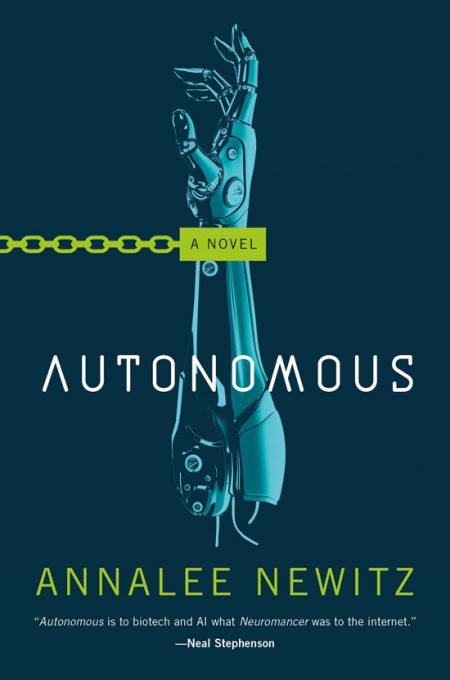
The plantation economy’s seemingly endless lifespan is traced forward in Autonomous (Tor Books), the fascinating debut novel from renowned tech writer Annalee Newitz. A journalist at Ars Technica, a veteran of Gawker’s Gizmodo and a founder of io9, Newitz’s science and fiction background (an early short story appeared first on HILOBROW) are rare training for this trip into the mid-22nd century. No dehumanized dystopia, this future is a wilderness of invention and a worldwide bazaar. Nations have long since given way to economic coalitions (among them the Eurozone, the African Federation, and the former North America’s characteristically creative reboot as The Free Trade Zone); the gig and sweatshop business-plans of our time have devolved to a teeming global workforce of contractually indentured humans; and sentient machines have evolved from our computer-realities and talking refrigerators alongside a planet-full of more organic, patented life (from 3D-printed replacement bones and tissue to bioluminescent house-paint).
The worst nightmares of our time (climate catastrophe, pandemics) have been conquered — by widespread clean energy, protective coastal terraforming, and miracle drugs from infinite genetic recombination — while the corporate state has upgraded us to all new terrors (ill-policed involuntary servitude; drug patents that can hold whole afflicted continents hostage).
Life and information each want to be free, so both humans and AIs can (in theory) work off the debt of their poverty (humans) or manufacture (AIs) and gain legal “Autonomous” status over time — while radicals and pirates don’t wait, Robin Hood-ing duplicated drugs to those who need them but can’t pay, and throwing off the ubiquitous surveillance grid to remain untraced.
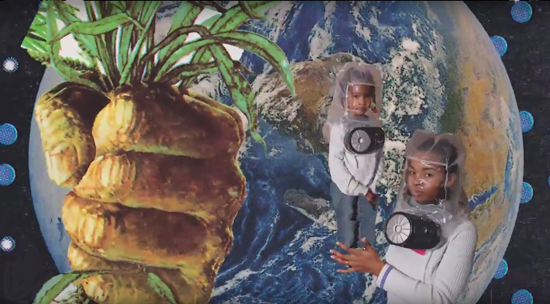
In Newitz’s thrilling narrative, gifted bioengineer and patent-resister turned medical pirate Jack Chen races to solve a crisis she herself had a hand in, while psychically scarred IP enforcer Eliasz and emotionally evolving military bot Paladin hunt her and her allies like the renegade slave Threezed and free-born lifelike hospital-bot Med, as staggering corporate misdeeds and poignant inner conflicts course under the surface, unknown to those who most need to. Newitz’s world is intensely believable, solidly rooted in and then riotously diverged from our own. Observational and never expository, it is a phenomenal work of future journalism, dispatched from a setting where the vivid scenes and personalities we encounter are seamless with the profound ideas that shape their character and context. Precise in its scientific premonitions and painterly in its sensory language, the world of Autonomous is one that won’t leave you for long after you’ve passed the last page.
But back somewhere in the broadband ether between coasts in the U.S. of autumn 2017, I spoke with Newitz about the psychic source-code of her new signature story…
JOSH GLENN’S *BEST ADVENTURES* LISTS: BEST 250 ADVENTURES OF THE 20TH CENTURY | 100 BEST OUGHTS ADVENTURES | 100 BEST RADIUM AGE (PROTO-)SCI-FI ADVENTURES | 100 BEST TEENS ADVENTURES | 100 BEST TWENTIES ADVENTURES | 100 BEST THIRTIES ADVENTURES | 75 BEST GOLDEN AGE SCI-FI ADVENTURES | 100 BEST FORTIES ADVENTURES | 100 BEST FIFTIES ADVENTURES | 100 BEST SIXTIES ADVENTURES | 75 BEST NEW WAVE SCI FI ADVENTURES | 100 BEST SEVENTIES ADVENTURES | 100 BEST EIGHTIES ADVENTURES | 75 BEST DIAMOND AGE SCI-FI ADVENTURES | 100 BEST NINETIES ADVENTURES (in progress) | 1994 | 1995 | 1996 | 1997 | 1998 | 1999 | 2000 | 2001 | 2002 | 2003 | NOTES ON 21st-CENTURY ADVENTURES.
HILOBROW: I think the hallmark of great science fiction, like this book, is that the reader recognizes as much as their eyes are opened to — some conflicts are all too familiar. If we never learn, is there such a thing as a cautionary tale?
NEWITZ: I think the fact is that we do learn. And that cautionary tales are incredibly important; especially ones that sneak up on you, not ones that beat you over the head with the message. Those can be effective too; I love allegory, but I think most people find it really distasteful to be told what to think about a story [laughs]; they’d rather have a story, and then think about it, mull it over. About cautionary tales — humans have been learning, we’ve been learning from our mistakes; the problem is that we just learn a lot more slowly than we wish — every generation is like, “Why didn’t we get all this stuff fixed, why haven’t we fixed climate change already??” and it’s like, well, we only discovered climate change in the 1950s, and we are trying to, slowly, and in a confused and conflicted way, deal with it, and we are inevitably gonna have to deal with it more, but humans do not learn as fast as we wish… we spread quickly, but we learn slowly! It feels like there’s no point, when in fact, there is a point, you just won’t find out for 500 years. That’s one of the pleasures of science fiction; it lets you take a longer view and see how things can change over time.
HILOBROW: As I finished the book, it occurred to me that, in the same way we always have that very clear hindsight about what we should have fixed, science fiction reverses the process, by foreseeing what we won’t fix…
NEWITZ: That’s true… sort of depressing [laughs], but yeah.
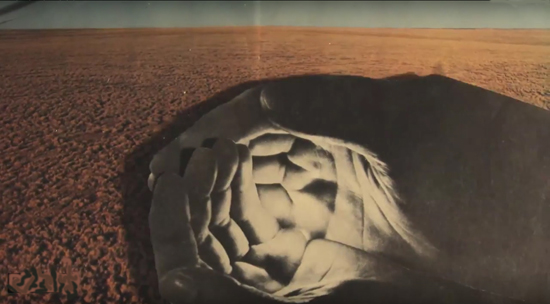
HILOBROW: To your point about this book not being a direct allegory, I really enjoyed the way you allow for the poetry of the situations — the natural (and bioengineered) landscape, the characters’ memories, the ancient wonders still standing and futuristic marvels springing up — this room you make for beauty and emotion makes it even more shocking when it erupts into hideous violence. That violence is of course a common feature of all thrillers, but in stories of the future it seems so ubiquitously close to home — right now we’re talking on equipment that was manufactured by faraway factory-slaves, but in Autonomous such contradictions are side-by-side. Is part of the purpose of science fiction to close that distance between our actions and their consequences?
NEWITZ: It can help us see that. It doesn’t have to; there’s plenty of science fiction where it’s much more modernist, like, Samuel Delaney’s works, which are very much within someone’s mind(s). For me, when I thought about this novel, and wanted to describe how actions have consequences, and where labor comes from, what it means to be indentured, which I think is something that is not that far away from what a lot of people experience now, I was thinking about the naturalist and realist traditions in literature. I really did strive to make this feel like a realist novel, even though it’s set in the future, so obviously part of it’s just pulled out of my ass [laughs]. I’m very influenced by the naturalist tradition specifically, and that is a form of realism that has a lot of violence and a lot of extreme things happening, that are nevertheless real, that could actually happen. There’s a reason why I stuck in a little reference to Martin Scorsese in the novel, because I grew up watching his films, and thinking about his style, and the way that he’ll have these very slow, quiet moments, and then these eruptions of violence — y’know, that is how things are in reality; there is violence, and it’s a big part of what it means to be human. And a big part of what it means to have a capitalist economy, because if you don’t have violence it’s really hard to “inspire” people to have the “right feelings” about work, so I was trying to jam all that stuff in there.
HILOBROW: Interesting what you say about the naturalist tradition, because my personal definition for the science fiction I relate to most (and for my own when I write it) is that it’s depicting the everyday of 200 years from now. Not grand and epic, but what an average day would be like in what is to us a completely alien context.
NEWITZ: That’s why I love the movie Looper by Rian Johnson; I feel like he takes this incredibly weird world, really well-realized, in an alternate reality where we have time-travel, and then just shows us kinda, scuzzy gangster life. It’s kinda dirty, people’s motivations are pretty humble, “I just wanna score some cash”; nobody’s trying to save the world, or kill Hitler, they’re just trying to get by.
HILOBROW: Yeah, a time-travelling hitman’s crappy day at the office. [laughter] Bot/human interaction is very commonplace in Autonomous too, and the theme of humans anthropomorphizing the mechanical beings reminded me that, as a kid, I thought of our string of doomed used cars as if they were family pets, or the equivalent of a bygone-era household horse — very much attributed living qualities to them. We see that happening in the book, while at the same time, every part of life (and form of life) is monetized. Which is stronger, our impulse to commodify people or to personify things?

NEWITZ: You’re getting at one of the fundamental tragedies of human civilization: that we have these warring impulses; one impulse is to grant personhood to all kinds of things, and I think that’s a really benevolent, progressive impulse, though it’s sometimes silly; and the opposite impulse is to commodify everything. And commodities are, as Marx very eloquently put it, “dead labor”; they are basically a form of living death, because the people who make them never get to benefit from them in any way, and they come to us out of nowhere, just these miraculous things; like you said, we’re talking on headsets right now that were made by people somewhere, and we don’t know how they got here, we don’t know the conditions under which they were shipped to us, and all of those humans who went into making these headsets, and bringing them to us, their dead labor is kind of crusted up inside of [the products], and we’re just wearing them around like rotting meat. … Luckily they don’t rot, that’s what makes them so great. [rueful laughter] So that’s really at the heart of Autonomous, and at the heart of what I’m trying to get at: that humans really are struggling to turn everything into dead labor, but also wanting to fill everything with life. And it’s a really hard balance to have, and usually it ends up with a lot of people dying and leading lives that are sometimes worse than death; there’s really not a good outcome. Maybe in some future utopia we’re gonna figure it all out, figure out how to have an alloy of the two impulses, but right now, we really don’t.
HILOBROW: It’s funny that you talk about our devices not rotting, ’cuz of course in the book, they do rot, or at least everything is designed to biodegrade — does it feel hopeful or dystopian to you that it may be The Market that finds ways for the planet to survive, because they need a planet to sell to? When I was involved with activism against nuclear power and for renewables in the 1970s, people would say, “Well, we don’t just want ConEd to put a meter on the sun,” and I’d think, I’d rather pay for sunlight than die of radiation… that may be a false choice forced on us by capitalism, but in Autonomous solar and wind power are widespread, consumer materials disintegrate rather than clog landfills, etc. — does this feel like something to look forward to, or a sign that corporations will always keep their grip on what everyone has a right to?
NEWITZ: It’s both, right? It is hopeful that the corporations have figured out that there is a way to make money on sustainable energy. They’ve also figured out how to reinvent slavery. Some people have said they felt that Autonomous was dystopian, and my feeling is that it’s just… topian? Like I said, it’s intended to be realistic, so it’s very much like today: there’s some really terrible things that are happening, [though] in some ways medicine has improved, sustainable energy has improved, there are certain kinds of relationships that are no longer taboo if you’re living in the right place — some characters are just, not worried about being gay or straight because they come from a more liberal economic zone — but other things are worse. And I think that’s how history works; we never fix everything all at once. And things may get a lot worse before they get better, or some things may get better at the expense of others. So we might get better sustainable energy, but [also] these horrific arrangements where people are enslaved for their whole lives.
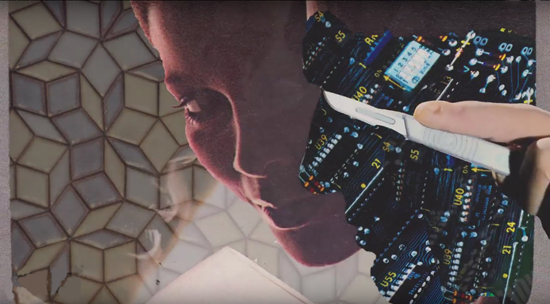
It is a problem that we’ve had, historically, even before we had capitalism; in Autonomous it’s supposed to be a world where capitalism has become the dominant form of social relationships, and… it’s untenable, you can’t keep people enslaved. Slaves are not happy, and when they’re sentient, and capable of forming relationships with each other, they will not stand for it, it’s not gonna be able to continue. I imagine that all of the subversives we meet in Autonomous are just a tiny little blip of a much larger group of people, and robots, and maybe uplifted animals too, like maybe there’s some octopuses in there that are fuckin’ shit up [laughs], some super-smart chimps who are hanging around with robots and coming up with ways to subvert humanity. And I think eventually they are gonna rise up, in some way — but we don’t get to see that in the book [laughs].
But I think the hope in the book is that, as bad as it gets, there’s always people fighting — and fighting on a whole bunch of different fronts; there’s pharmaceutical piracy, there’s anti-indenture movements, there’s just regular people falling in love in ways that teach them new things about humanity — so there’s many, many forms of resistance. That hasn’t gone away. So to me that’s the hope. But there is no… I don’t think there’s ever gonna be that moment where suddenly things are so much better that it doesn’t feel a bit dystopian; even far into the future there’s always gonna be people who feel like they live in dystopia, because they kinda do.
HILOBROW: It comes back to William Gibson’s axiom that the future is already here, it’s just not evenly distributed.
NEWITZ: That’s very influential on my thinking, and also just the idea that one person’s utopia is another person’s dystopia. I think there’s definitely people in the world of Autonomous who are living their best life, and they’re like, “Yay, I live in my sustainable off-the-grid cabin with my polyamorous family, and we’re learning about how to build co-ops,” and they’re off in their bubble, and everyone else is struggling just to not be enslaved.
HILOBROW: We see one slender line running into a possible revolutionary future when the one bot says to Jack, “It’s time for humans to understand that property is death” — though that already happens 20 years ago in the book’s time, and we haven’t seen this basic renunciation of capitalism take hold…
NEWITZ: And that’s actually an Easter egg related to a short story I wrote called “Drones Don’t Kill People” which is set much earlier in the timeline of the Autonomous world; it’s about the first robot uprising, and it’s a peace movement — these drones no longer want to be weapons, so they figure out how to get root on their own minds and they stage [a resistance]. Some of the drones [in Autonomous] are kind of a reference back to that group of drones, who do believe that property is death — that to me is the final phase before any kind of old-fashioned socialist uprising, the moment when people connect the dots that property isn’t just oppression. Once you have beings around you who can be property, who start their lives as property, that makes everything more literal and clear. When an entire class of people can be property, it makes it more obvious how horrible the property system really is.
HILOBROW: So that rallying cry from the bot to Jack is a trail into the past, leading to what already hasn’t happened, sigh.
NEWITZ: [Laughs] Yeah. Jack doesn’t really understand indenture very much. She’s grown up in relative privilege, so for her, intellectual property is a crime, but she hasn’t really known people who had been indentured. She can’t make that connection and see the bigger issue. It’s hard for one person to understand everything [laughs].
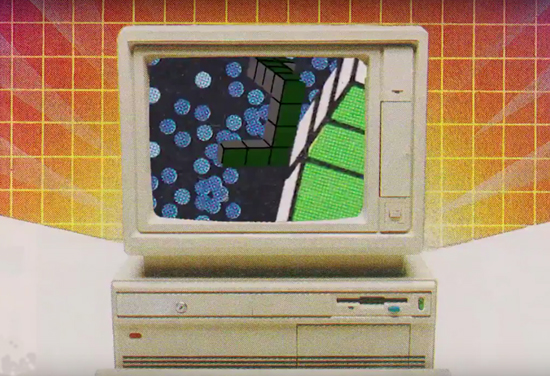
HILOBROW: Speaking of what we understand, in Autonomous’ world everything is surveillable though everyone’s also behind some kind of mask (cover-identities, encryptions, pseudonyms, indenture-numbers, robot encasements)… and there are two characters who respectively want to keep certain thoughts for themselves (a newly independent A.I.) and from themselves (a circumspect, human-raised android looking up a friend’s journals). How much should we not know?
NEWITZ: I am a big fan of ambiguity in writing. So there are several moments in this book where I just invite the reader to figure shit out. Characters like Eliasz, who are really emotionally conflicted… there may not be an absolute, final truth to what he feels, because he may not know what he feels, or he feels two things simultaneously that are equally compelling. Not-knowing links into that central belief in ambiguity. There’s this question for me of, when people are friends, or intimate, how much really is necessary to know, and at what point does it become creepy and obsessive and unhealthy. Because everyone needs to have a little bit of privacy inside their own head. One of the things that’s toxic about social media is that we’re encouraged to reveal everything about ourselves, and that becomes a value; how much of yourself can you confess to the world.
Threezed [the indentured human] grew up with private thoughts in his head, and chose to reveal his private life on social media, whereas Paladin [the military bot] grew up with no private thoughts, never had privacy in her own mind; from the very first moment she was aware, she knew that her thoughts were public and could be accessed by any number of people. So for her privacy has a really different meaning. Having that control over what you share and don’t share, that’s really important to forming an identity, figuring out who you are. It’s a coming-of-age moment. Of course, no one ever really fucking figures out who they are; I’m almost 50, I have no idea who the hell I am [laughs] — I have a pretty good idea, I know more than I did when I was Paladin’s age — it really is just about figuring out what your Self is, and you have to have a little bit of privacy in your head to do that.
HILOBROW: It’s about definition, rather than completion.
NEWITZ: Completion is death, I guess! [laughter]
Images (below book cover) excerpted from “Autonomous” companion music video by Sunny Adams.
MORE POSTS by ADAM McGOVERN: OFF-TOPIC (2019–2025 monthly) | textshow (2018 quarterly) | PANEL ZERO (comics-related Q&As, 2018 monthly) | THIS: (2016–2017 weekly) | PEOPLE YOU MEET IN HELL, a 5-part series about characters in McGovern’s and Paolo Leandri’s comic Nightworld | Two IDORU JONES comics by McGovern and Paolo Leandri | BOWIEOLOGY: Celebrating 50 years of Bowie | ODD ABSURDUM: How Felix invented the 21st century self | CROM YOUR ENTHUSIASM: C.L. Moore’s JIREL OF JOIRY stories | KERN YOUR ENTHUSIASM: Data 70 | HERC YOUR ENTHUSIASM: “Freedom” | KIRK YOUR ENTHUSIASM: Captain Camelot | KIRB YOUR ENTHUSIASM: Full Fathom Five | A 5-part series on Jack Kirby’s Fourth World mythos | Reviews of Annie Nocenti’s comics Katana, Catwoman, Klarion, and Green Arrow | The curated series FANCHILD | To see all of Adam’s posts, including HiLo Hero items on Lilli Carré, Judy Garland, Wally Wood, and others: CLICK HERE
